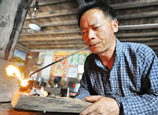
It was the way her mother had taught her as a girl growing up in East China's Anhui province, she explained.
Things have changed, however, since Feng and her 13-year-old daughter, Wei Wanying, took part in a free program for migrant worker families, run by Maple Women's Psychological Counseling Center.
During the program, which involves parents and children attending a two-hour workshop every Friday for six weeks, professional psychologists teach how to improve communication and build mutual respect through lectures and games.
"It helped me see that a child's mood can be greatly affected by the actions of a parent," said Feng, who moved with her family to the capital two years ago. "Scolding and beating them is not the way to teach a child.
"I never used to praise my daughter before, but now I see she's happier when I encourage her," she said. As a result the sixth-grader at Haidian Xingzhi Experimental School is performing much better in class. "She scores 80 in math tests (well above a pass). Before, she usually failed."
Wei agreed, and said she has witnessed a real change in her mother. "She gives me confidence now, and she doesn't criticize me in front of others," she said. "I feel I have dignity."
Same goal
Roughly 15,000 parents have taken part in the program since it started in 2007. Wu Fei, a project officer at the center, said each class has about 50 people.
The center also cooperates with 15 schools for children of migrant workers in Beijing, setting up after-class counseling sessions and other activities, all with the same goal: improving relationships.
For example, the weekly workshops feature trust exercises, including one in which a parent is blindfolded and must rely on their child to guide them through an obstacle course. In another, parents are asked to list their child's qualities.
Li Guangqin, who has an 11-year-old daughter, said after attending the class she had tried to avoid getting into arguments with her husband to create a better family atmosphere.
"Children can be affected by quarrelling parents, so we're trying hard not to fight any more," said the hotel worker from Henan province. "We're also trying to show our girl more affection on a regular basis."
Like in Feng's case, the change has not gone unnoticed. "My mother seems more concerned about me than before," said Qin Nan, Li's daughter. "After I finish my homework, she checks it and answers the questions I don't know."
The impact of the Maple program is obvious, according to Wu, who said many parents quickly realize the importance of family education and change their attitude, showing more respect and love toward their children.
 |
















 Gun fight between police, drug dealers in China's Chengdu
Gun fight between police, drug dealers in China's Chengdu


![]()
